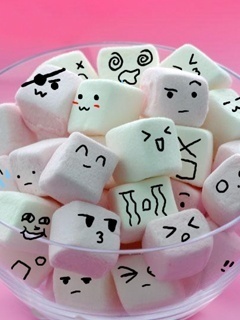
INTRO: Wordmasters Avi Arditti and Rosanne Skirble have put together a jiggy update on some slang terms. What's jiggy, you ask?
MUSIC: "Gettin' Jiggy with It"/Will Smith
AA: That's Will Smith, but what's that song all about? What does "getting jiggy" mean? RS:That's what David Ngwesa in Tanzania would like to know. Ditto for the term "da hood."
AA: For answers, we turn to "Slangman," the author in Los Angeles otherwise known as David Burke.
TAPE: CUT ONE — BURKE/SKIRBLE
BURKE: "'To get jiggy with it' means to get energetic, let's have a really great time. For example, 'whoah, this party is jiggy!' It's energetic, it's fun. Or we might even use 'jiggy' to mean attractive."
RS: "And you might be energetic and attractive in a 'hood.'"
BURKE: "Very good! And you're not talking about a piece of garment either."
RS: "No, you're not, you're talking about 'da hood.'"
BURKE: "Da hood — neighborhood. As we've spoken about this before, the trend in slang is shorten, shorten, shorten. So, 'the neighboorhood' — oh, that's way too long, [thus] 'the hood.'"
AA:But the right way to say it is DA hood, D—A.
RS: If you say THE hood — T—H—E — people might think you're "wack."
TAPE: CUT TWO — BURKE/SKIRBLE/ARDITTI
'Wack' comes from the original slang — again, the trend with teen—agers, in addition to shortening, is to update terms. To be 'wacked out' is a common slang term to mean to be crazy, to be nuts, 'oh he is wacked out.'"
RS: "Or wacko."
BURKE: "To be 'wack' can mean two things: either to be crazy — 'what are you talking about, are you wack?' — or it means to be ugly."
AA: "The thing with 'wack' where I see it could be confusing is that this is W—A—C—K, not to be confused with W—H—A—C—K which means either to hit someone or, in Mafia—speak, to have someone killed, to have him 'whacked.'"
BURKE: "Right, and that's a very good point, especially with academic English where the W—H — this is in controvery a lot, especially in English classes because the way to pronounce the W—H is /hw/ [with a breath]. For example, /hw/at [what], /hw/ere [where]. But in common, everyday speech we don't say that. We say /wot/ and /wear/. The color white: some people say /hw/ite, some people say /wite/. So that's why, when you say wack, that could be /hw/ack or it could be /wack/. You have to listen for the context."
RS: "Let's drop down to another listener question, from Ali Gado in Nigeria. He asks, 'If a friend or a colleague says thank you, what's the proper way for me to respond?' And he gives us a) thank you too, b) you're welcome, c) my pleasure, d) no charge — no charge? — and e) no problem. I would eliminate 'no charge.' I think he just threw that in to confuse us."
BURKE: "Oddly enough, I have heard that as a response."
RS: "No kidding? What could that mean."
BURKE: "No charge simply means, 'it's on me,' no problem, I'm not going to charge you for it.'"
AA: "And not necessarily between a storekeeper and a customer?"
BURKE: "Don't you wish you were the customer! Actually I'd have to say answers a, b, c, d and e are all appropriate depending, again, on the context, especially b through e. Let me explain: A) Thank you too. You'd only use that response if the other person that you're thanking has also done a favor for you as well. If that person has not, then you'd simply say 'you're welcome,' that's the most common response, or 'my pleasure' — that's just telling the person that it gave you great pleasure to render that service to the person. And the other one, 'no problem,' that's also extremely acceptable. That just means it was absolutely no problem for you to help that person in what they needed."
MUSIC: "Going to the Chapel"
AA: On to a question from a college student in China.
Hillary Kong likes to read American magazines but sometimes finds a confusing term — like "altar—bound."
RS: ... which is just a fancy way to say "getting married."
TAPE: CUT THREE — BURKE
"Altar—bound is something we would hear — in fact not really hear that much, but we would see it. It's more literary than it is actually spoken. Altar—bound — the altar is in a church, and if you're altar—bound, you're going to that altar at the front of the church. 'He's altar—bound' or 'she's altar—bound.' What's more spoken and more heard in today's lingo and in slang would be either 'to tie the knot' or to 'get hitched.'"
RS: "You wouldn't say, for example, 'well, I won't see you tomorrow, I'm altar—bound.' It is a little literary."
BURKE: "Well, you have to consider where Hillary got these terms, from Time and People. These magazines tend to be a little more flowery in their literary usage of some of these terms."
AA: To learn more about American slang, you can look for the "Street Speak" books by David Burke.
RS:Or, if you have access to the Internet, you can visit his redesigned Web site at www.slangman.com.
AA:Next week, a visit with Grammar Lady!
RS:With Avi Arditti, I'm Rosanne Skirble.
MUSIC:"Gettin' Jiggy with It"/Will Smith
OPT: That song earned Will Smith a Grammy last year (for best rap solo). This year he's nominated again (for "Wild Wild West"). Will he win? Find out when the American music industry presents this year's Grammy Awards on Wednesday night.
詞匯點津:
今天的《詞匯大師》向我們介紹了幾個常用俚語。
getting jiggy表示get energetic,attractive,如:To get jiggy with it. whoah, this party is jiggy! 表示這個聚會有趣充滿活力。
da hood表示neighboorhood
人們常用the hood,但正確的用法還是DA hood。
wack,wacked out表示crazy, to be nuts,或ugly,如:oh he is wacked out. what are you talking about, are you wack?
wack的形近詞whack表示to hit someone或to have someone killed。
別人對你說thank you的時候如何respond?以下幾種選擇都是不錯的喲:Thank you too,you're welcome,my pleasure或no problem。
altar—bound俚語,表示getting married,同義的詞組還有:to tie the knot,get hitched。











